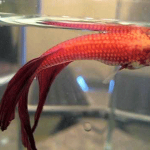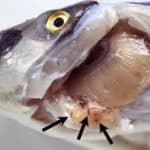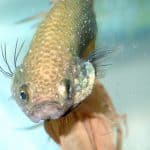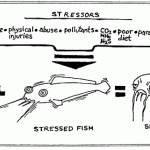If you find that your betta is gasping at the bottom or surface of the tank, pale in color, has a limp tail fin, unresponsive eyes and with their gills fanning visibly then they may be in critical condition. There are a few things you can do to increase their chances of survival. Prevention is the Best Cure Preventing inhospitable conditions that can lead to the death of … [Read more...] about How to Save a Dying Betta Fish
Illness & Disease
Steps for Illness Prevention
1. If you have a betta die - scour and scald the old bowl Many fungal and bacterial growths, as well as parasites, can live in adverse conditions. When your betta passes on, it is possible the reason he/she died is still present in the tank/bowl. By cleaning the bowl thoroughly you can kill whatever lurks and prevent passing it on to a new betta. 2. Sick Tanks are a … [Read more...] about Steps for Illness Prevention
Human Mycobacterium marinum Aronson Infections
ABSTRACT Mycobacterium marinum Aronson is generally known as a pathogen of fishes. Since 1962 it has been recognized as causing localized infections on the extremities of humans. Three cases are reported, with cures being effected by use of clarithromycin, ethambutol, minocycline, and rifampin. Cuts or abrasions should not be exposed to aquatic environments or organisms, and … [Read more...] about Human Mycobacterium marinum Aronson Infections
Monogenea of Fishes
Monogenetic trematodes (Monogenea) are parasitic flatworms mostly found on the gills, fins, skin, and eggs of freshwater and saltwater fishes. They vary in size from about 100 microns to 2 to 3 cm in length. They hold onto their hosts via a combination of hooks, anchors, and suckers at their posterior end (opisthaptor), and use the anterior end (prohaptor) for feeding and … [Read more...] about Monogenea of Fishes
Hyperplasia in Fishes
Hyperplasia is a fancy way of saying abnormal increase in cell numbers or cell numbers "gone wild" leading to a size increase of the affected tissue or organ; it can also be used as another term for benign growth, or tumor. Hyperplasia can be induced by many things, including chronic inflammation, hormone dysfunction, and irritants of many sorts. In humans some examples of … [Read more...] about Hyperplasia in Fishes
How do I euthanize my fish?
The Merriam-Webster Online Dictionary defines Euthanasia as follows: the act or practice of killing or permitting the death of hopelessly sick or injured individuals (as persons or domestic animals) in a relatively painless way for reasons of mercy. As a fish keeper, there may come a time that you need to euthanize one of your fish. In this article we will look at the … [Read more...] about How do I euthanize my fish?
Danger Signs With Your Fishes
PREVENTION is better than cure. Few aquarists are not familiar with that age-old adage. Yet how many are aware of its import in modern aquatics? Too few for their own good and for the good of their stock, for though the last decade has seen many important advances in the treatment of diseases in freshwater fishes, our knowledge of their internal diseases and disturbances is … [Read more...] about Danger Signs With Your Fishes
How to Quarantine Fresh and Salt Water Fish, and Invertebrates
While at first thought quarantining your newly purchased fish or invertebrate may seem to be a royal pain, this simple procedure can, in the long run, save you from a number of problems that could endanger the well-being of the animals already present in your system. One should assume that all fish, either captive bred or (especially) wild are carriers of one form of nasty … [Read more...] about How to Quarantine Fresh and Salt Water Fish, and Invertebrates
Three Strikes
Over time, each species of fish has evolved to fit into the environment in which it is found. Because the species has evolved over thousands of years to a particular environment, that environment can be termed to be the optimum environment. As fish keepers, when we know a species' optimum environment, we can then modify an aquariums set-up to most closely suit that species. … [Read more...] about Three Strikes
Fish Tank Granuloma
Recently, I opened an inter-office envelope from a colleague, a physician and expert in fish disease and pathology, and inside found a medical journal article from 1962 with a note stating, “I think that you might find this interesting!” The article was entitled, “Granulomas of the Skin due to Mycobacterium Balnei After Abrasions From a Fish Tank” and was written by two … [Read more...] about Fish Tank Granuloma









